Hungary has announced its withdrawal from the International Criminal Court (ICC) following Israeli Prime Minister Benjamin Netanyahu’s arrival in Budapest for a state visit.
The move, condemned by human rights groups, comes as Netanyahu faces an ICC arrest warrant over alleged war crimes in Gaza, the one Hungary’s government has vowed to ignore.
Hungary’s Minister for the Prime Minister’s Office, Gergely Gulyás, confirmed the withdrawal process would begin on Thursday, stating it aligns with the country’s “constitutional and international obligations”. The decision, however, follows years of escalating friction between Budapest and the ICC, which indicted Netanyahu, former Defence Minister Yoav Gallant, and Hamas leaders in November 2023 for actions during the Gaza conflict.
Prime Minister Viktor Orbán, a staunch Netanyahu ally, dismissed the ICC’s authority, declaring the warrant “null in Hungary”. His invitation to Netanyahu—marking the Israeli leader’s first foreign visit since the warrant’s issuance—underscores Hungary’s defiance of EU unity.
All 27 EU states, except Hungary, remain ICC members and are treaty-bound to arrest Netanyahu if he enters their territory. Hungary has blocked multiple EU resolutions urging Gaza ceasefires or criticising Israel’s conduct, earning praise from Netanyahu for its “moral clarity”.
The ICC’s warrant accuses Netanyahu and Gallant of crimes including “starvation of civilians” and “intentionally directing attacks against a civilian population” during Israel’s bombardment and siege of Gaza. Meanwhile, Hamas leaders face charges of extermination, hostage-taking, and sexual violence.
EU isolation, legal repercussions
Hungary’s exit from the ICC may leave it diplomatically isolated within the EU. The bloc has long championed the ICC as a cornerstone of global justice, though key powers like the US, China, and Russia remain non-members.
Human Rights Watch condemned Budapest’s decision as “a shameful betrayal of victims” and a “green light for impunity”. EU officials, while critical, have limited leverage over Orbán’s government, which has repeatedly clashed with Brussels over rule-of-law concerns.
The withdrawal signals a broader erosion of multilateral institutions under Orbán’s leadership. Since 2010, Hungary has withdrawn from several international agreements, including the UN Compact on Migration. Critics argue that withdrawing from the ICC brings Orbán even closer to leaders who reject the effectiveness of international social institutions.
As Netanyahu’s visit reinforces Hungary-Israel ties, the move risks deepening fractures within the EU, where member states grapple with balancing solidarity and sovereignty.
